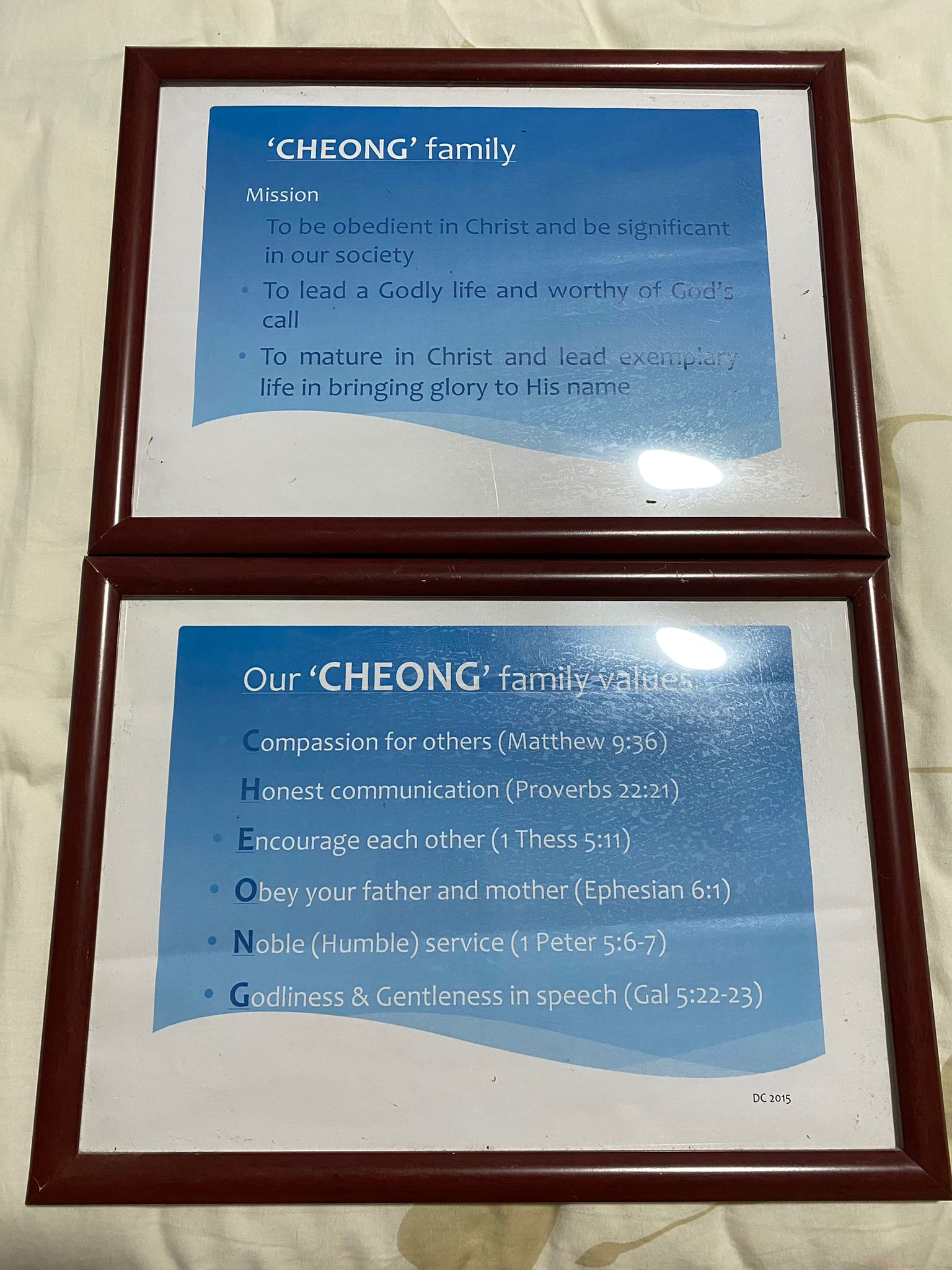Snuggling at bedtime prayers, holding hands while saying grace: Families share little things that build big faith in their kids
by Christine Leow // February 15, 2022, 12:48 pm

From incorporating God into their daily routine to intentionally reserving a special time for family devotions, families share tips on how to pass on their faith to the next generation. Photo from Pexels.
She is already all grown up with teenage children of her own and it has been decades since she last lived under the same roof as her parents. In fact, they are not even in the same time zone.
But Lois Yong still remembers fondly how her parents raised her and her older sister, Sarah, in the Christian faith.
“Nightly prayers were always done in such a loving manner.”
“We prayed together before bed every night. It was part of our bedtime routine, like brushing teeth and putting on pyjamas. But prayer time was special.”
Lois and Sarah would snuggle with their parents and, from the youngest to the oldest, be “encouraged to pray from the heart, and have real and transparent conversations with God”.
Because she was so young, her prayers then were simply “Thank you, God. Amen.” But it was the family closeness that Lois remembers and loves best.
No matter how busy her parents were – and they were very busy because her father was a pastor in a Sabah church – they always made it a point to be “fully present during prayer time”.

Lois Yong (right) with her older sister Sarah when she was seven and Sarah was nine. The sisters grew up in Sabah where their father was a pastor. Photo courtesy of Lois Yong.
“It was always done in such a loving manner.
“I loved to lay my head on my mum’s lap while we prayed, feeling both the physical and spiritual connection, which is something I still treasure today.”
Three families share with Salt&Light how they build faith in the next generation, one bedtime prayer, one family devotion, one God conversation at a time.
1. Create God moments
Dominic Cheong and his wife Cyrene, both 43, are raising six children aged two to 14. To say they are busy would be an understatement.

The Cheong clan with Dominic (centre) and his wife Cyrene and their six children. They are dressed in their family tee-shirt. Photo courtesy of Dominic Cheong.
So, instead of waiting for sizeable chunks of time to teach his brood, he creates God moments throughout the day.
“We bless them before they leave for school and we sing worship songs whenever we are free – in the car, at home,” said Dominic.
Seizing these God moments is important, agrees Senior Pastor of True Way Presbyterian Church, Lee Kien Seng, 55. He has three children – a son and a daughter who are already young adults in their 20s and a 13-year-old son.
“We pray in the car as I send my daughter to work, as we make our way to church on Sundays, and each time we set out for a road trip.”
When his elder son and daughter were young, time in the car as he sent them to school were times of prayer. The practice has not stopped.
“Even right now, we continue to pray in the car as I send my daughter to work, as we make our way to church on Sundays, and each time we set out for a road trip.”
When his youngest child, now in Secondary 1, was in primary school, Ps Kien Seng would walk him to school. He would take the opportunity to point out the character of God during these walks.
“There are lots of things to see between home and school, and sometimes I’d remind him of the creative God whom we worship, seen through the variety of trees, leaves, flowers, dogs, cats and other creatures on land and also in the river.
“We give thanks to God for all things bright and beautiful.”
He said that these informal teachings are as vital as the formal times of teaching.
“I find Deuteronomy 6:4-7 helpful. ‘You shall teach them diligently to your children’ can refer to the formal times such as family devotions set aside to intentionally teach God’s Word to our children.
“‘You shall talk of them when you sit in your house, and when you walk by the way, and when you lie down, and when you rise’ are the informal times, the teaching moments where we bring God into our conversations.”
2. Cultivate habits early
Ps Kien Seng also believes in the practice of training a child (Proverbs 22:6) while he is young. He has made attending Sunday worship service a priority for his children right from the start.
“Even when exams were around the corner, we didn’t compromise on church attendance.
“I am so glad that, during this Covid period, the moment church opened up for on-site service, the older children were quick to say that they wanted to come back to church for worship service every week.”

Ps Lee Kien Seng (left) with his wife Ai Tin and their children Gavriel, Salt&Light writer Gracia and her fiancé Joel, and Gaius (in yellow) with his wife Gloria. Photo courtesy of Ps Lee Kien Seng.
Even for very young children, attending church service with their parents is beneficial.
“Don’t worry that they cannot understand the sermon. Worship is not merely cognitive,” said Ps Kien Seng.
“Helping our children to worship God is also an act of worship that we can offer to the Lord.”
In his church, on the first Sunday of the month, children of all ages join their parents at the worship service.
Added Ps Kien Seng: “As the child gets older, parents can play their part to help them better understand what’s going on during worship.
“They can talk to them about the preaching text on Saturday nights to prepare their children to listen to the sermon.”
For those in kindergarten and primary school, parents can guide them to draw pictures that describe key words mentioned in the sermon.
“It may mean that parents will not be able to fully listen to the sermon because they have to attend to their children, but helping our children to worship God is also an act of worship that we can offer to the Lord.”
3. Build a family culture
In Lois’ household growing up, there was always the attitude of gratitude and the practice of sharing. It was very much a part of the family culture.
“We were taught to share our best and to give without holding back.”
Her parents regularly opened up their home to visiting theologians and missionaries to stay with them.
“We were taught to share our best and to give without holding back. It didn’t matter whether the gift was large or small, what mattered was the heart and motive behind the gift. This was true of time, talent and treasure.
“My parents were also very vocal in acknowledging that all good gifts come from the Lord. They were equally open in communicating their appreciation for the people around us who shared gifts with our family.
“Their model of gratitude spoke volumes in helping me recognise God’s presence in my life.”
In the Cheong household, the family mission – to live a life that glorifies God – hangs on the wall as a daily reminder alongside the family values, which uses the letters from the family’s surname.

The Cheong family mission and values spelt out and displayed in the home. Photo courtesy of Dominic Cheong.
In the Lee family, saying grace before a meal is a mini event in itself. Everyone holds hands across the table, even if they are dining in public.
“Sometimes, the children lead in prayer. Gavriel, our youngest, is especially keen on saying grace for the family.
“Sometimes, he would give thanks to God for every dish on the table, much to the impatience of the older siblings.”
4. Let discipleship be caught
Said Ps Kien Seng: “I didn’t explicitly tell my children that they must pray.
“But I think they see me praying by myself quite often, and I also pray with them quite often. By living it out, the children see the importance of prayer for themselves.”
Lois’ children serve with her and her husband in church because it was something she and her sister did with their parents.
As young as seven and 10, Lois’ children would follow her to a learning centre for marginalised children where Lois taught Math and Literacy.
“My parents took us everywhere with them. Some of our best memories are from trips into the interior of Sabah where we learned to bathe in the river and use an outhouse.
“This is also where we experienced deep, authentic worship – God’s deep love for all people, and real fellowship among His children.”
As young as seven and 10, Lois’ children would follow her to a learning centre for marginalised children where Lois taught Math and Literacy. There, they served as reading buddies to the children whose parents were often illiterate. They would play with the children and also helped Lois grade simple Math papers.
“It was a joy to see them grow and develop relationships with kids from all backgrounds.”
It has been 10 years since then, and her son still joins her in ministry. He recently helped Lois move furniture and sort donations for an Afghan evacuee family whom the church was helping.
Her daughter, who is in university, is now the one who ropes Lois and her husband into her ministries.
Said Lois: “She is extremely extroverted and is constantly volunteering at all kinds of events. Whether it’s picking people up or hosting events, we are asked to be involved.
“She will tell you that volunteering as a kid and developing friendships with kids from all walks of life shaped who she is today.”
5. Be intentional
In the busy-ness of life, setting time aside to school the children in God’s Word becomes increasingly challenging. But Ps Kien Seng encouraged parents to persist.
“Sometimes, parents may feel very tired at the end of the day and are tempted to skip the devotion.
“I felt that way from time to time but I persevered, and I never regretted that I persevered.
“Something would be shared during the devotion that was so timely that if we had missed it, it would be such a pity.
“Even if it is only once a week, fix the day and time so that they will not give the excuse that they are pre-occupied with other things.”
“When they were very little, we would journal together at bed time.”
He had, however, some encouragement for parents.
“Don’t be too hard on yourself if there are days when you really crash and you or your children are just too tired to do devotion. Let it slide.
“Don’t make the children think that this spiritual discipline has to be legalistically observed.”
For Lois, intentionality comes in the form of purposeful conversations.
“When they were very little, we would journal together at bed time. We would ask the questions like, ‘What was the best thing you experienced today? What was the worst thing?’
“Later, we added, ‘Where did you see God today?’”
As they children grew up, Sunday meals became Sabbath meals. The family would go out for a nice dinner and chat about spiritual things.
“We would talk about everything and anything – questions, struggles, doubts, triumphs.”
6. Make it real
“Children can spot a fake a mile away,” declared Lois.
“If we really don’t know the answer, let them know that we will go and read up, and then we will come back to them.”
Her parents were always authentic and that drew Lois and her sister to the faith as they grew up.
“Everything they did flowed out of their relationship with God. They were consistent in their love for God and for others. Never were they super spiritual at church, only to be grumpy and complaining at home.”
Added Ps Kien Seng: “Parents do not need to feel that they must know the Bible well before they can teach God’s Word to their children.
“It is alright if we cannot answer all our children’s questions. Don’t bluff your way through. If we really don’t know the answer, let them know that we will go and read up, and then we will come back to them.”
7. Include the community
Said Ps Kien Seng: “Building faith also requires the community. Bring your children to church right from day one. Let them know that this is part of your family life.
“Let them interact with uncles and aunties in church. When they are babies, let the uncles and aunties carry them. When they are older, let the uncles and aunties take them out for outings.”
This gives them more people to “speak truths into their lives as they grow up”.
Salt&Light Family Night: How do I build a family of faith in this scary world?

Parents say that raising children now is harder than 20 years ago. This was revealed in an Ipsos poll conducted in the US last August.
This is probably a universal sentiment.
With our children exposed to so many influences in this age of information at the swipe of the finger, and 20% of Singaporeans identifying as having no religion, how do we raise a generation of faith?
Join us on Salt&Light as we talk through how we can help our children navigate the world and stay firm in their faith.
Our panellists for this session are:
Pastor Simon Say
Ps Simon was called to full-time ministry in 2001 and is now a member of the pastoral team at Kum Yan Methodist Church overseeing its Children and Family Life Ministries.
He also serves as an associate trainer with Scripture Union Singapore. Ps Simon’s vision is to see families intentionally discipled and restored to its biblical roots through God’s life-transforming Word.
Ps Simon is happily married to Huey Ming, his wife of 18 years, and is the father of one boy, Zachary, aged 12.
Jacqueline Chung and her daughter Faith
Jacqueline is Senior Principal and Academic Director of St James’ Church Kindergarten. She holds a PhD in early childhood education and is an Early Childhood Development Agency (ECDA) Fellow. She conducts workshops and talks on a variety of topics surrounding the visual arts, music, language and literacy, learning environments, mentoring and leadership.
Nicole Soh
Nicole is completing her mass communication studies in a polytechnic and is now an intern at a media company.
She is also in the Colson Fellows programme, a 10-month Christian worldview education programme studying how to engage culture to deal with the complexities of her generation.
Nicole serves in the children’s church at her church and was involved in her school’s prayer group. She regularly speaks in churches to children, youths, parents and ministry workers on dealing with media and cultural engagement.
Date: February 22, 2022
Time: 8.30pm-10pm
Cost: Free
Register here. Pre-registration is required.
About the hosts:
Carol Loi is a digital literacy educator, and leadership and family coach. A John Maxwell Certified Trainer for leadership and communication skills, she is also the founder of Village Consultancy, an organisation dedicated to equipping families, educators and children to be leaders and influencers both online and offline.
Alex Tee is former banker turned home-schooling father and wannabe farmer. He has been married to Channy for over 11 years and they have three children aged eight, seven and five. The deepest desire of their hearts is to prayerfully raise children to be part of a family who seeks first the kingdom of God and His righteousness. He firmly believes in the power of a living, lifelong education, and enjoys studying and learning from nature that reflects the ingenious mind of the Creator.
About the organiser:
Salt&Light is an independent, non-profit Christian news and devotional website with a passion for kingdom unity, and a vision of inspiring faith to arise in the marketplace.
RELATED STORIES:
We are an independent, non-profit organisation that relies on the generosity of our readers, such as yourself, to continue serving the kingdom. Every dollar donated goes directly back into our editorial coverage.
Would you consider partnering with us in our kingdom work by supporting us financially, either as a one-off donation, or a recurring pledge?
Support Salt&Light


